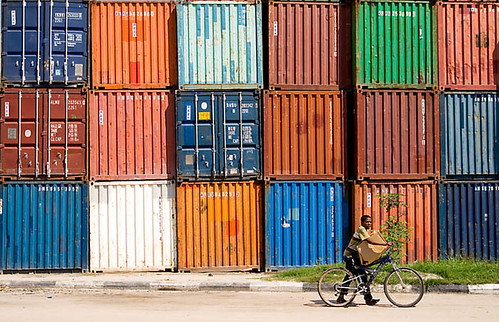The Next Empire
Posted by Big Gav in africa, china
The Atlantic has a look at Africa and China's interest in the continent's resources, asking "Do China’s grand designs promise the transformation,at last, of a star-crossed continent? Or merely its exploitation?" - The Next Empire.
I was about to embark on one of the world’s great train rides, a journey from this muggy Indian Ocean port city, the commercial capital of Tanzania, to the edge of the Zambian Copper Belt, deep in the heart of southern Africa. The official who’d sold me my ticket had seemed puzzled when I asked when the train would arrive at its final destination, and he refused to guess; in recent years, the 1,156-mile trip has been known to take anywhere from its originally scheduled two days to an entire week.
The railroad—known as the Tazara line—was built by China in the early 1970s, at a cost of nearly $500 million, an extraordinary expenditure in the thick of the Cultural Revolution, and a symbol of Beijing’s determination to hold its own with Washington and Moscow in an era when Cold War competition over Africa raged fierce. At the time of its construction, it was the third-largest infrastructure project ever undertaken in Africa, after the Aswan Dam in Egypt and the Volta Dam in Ghana.
Today the Tazara is a talisman of faded hopes and failed economic schemes, an old and unreliable railway with too few working locomotives. Only briefly a thriving commercial artery, it has been diminished by its own decay and by the roads and air routes that have sprung up around it. Maintenance costs have saddled Tanzania and Zambia with debts reportedly as high as $700 million in total, and the line now has only about 300 of the 2,000 wagons it needs to function normally, according to Zambian news reports.
Yet the railway traces a path through a region where hopes have risen again, rekindled by a new sort of development also driven by China—and on an unprecedented scale. All across the continent, Chinese companies are signing deals that dwarf the old railroad project. The most heavily reported involve oil production; since the turn of the millennium, Chinese companies have muscled in on lucrative oil markets in places like Angola, Nigeria, Algeria, and Sudan. But oil is neither the largest nor the fastest-growing part of the story. Chinese firms are striking giant mining deals in places like Zambia and the Democratic Republic of the Congo, and building what is being touted as the world’s largest iron mine in Gabon. They are prospecting for land on which to build huge agribusinesses. And to get these minerals and crops to market, they are building major new ports and thousands of miles of highway.
In most of Africa’s capital cities and commercial centers, it’s hard to miss China’s new presence and influence. In Dar, one morning before my train trip, I made my way to the roof of my hotel for a bird’s-eye view of the city below. A British construction foreman, there to oversee the hotel’s expansion, pointed out the V-shaped port that the British navy had seized after a brief battle with the Germans early in the First World War. From there, the British-built portion of the city extended primly inland, along a handful of long avenues. For the most part, downtown Dar was built long ago, and its low-slung concrete buildings, long exposed to the moisture of the tropics, have taken on a musty shade of gray.
“Do you see all the tall buildings coming up over there?” the foreman asked, a hint of envy in his voice as his arm described an arc along the waterfront that shimmered in the distance. “That’s the new Dar es Salaam, and most of it is Chinese-built.”






